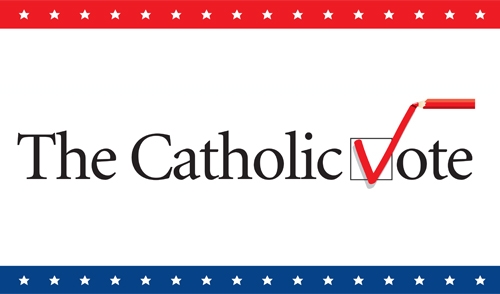Trump, Clinton after Catholics
 He pledged reform. Her campaign planned revolt.
He pledged reform. Her campaign planned revolt.
For half of this election year, ‘the Catholic vote’ got virtually no mention or attention in media coverage of the campaigns, while the Evangelical vote got plenty. Just before the summer conventions, Hillary Clinton named Tim Kaine as her running mate for VP, and the press featured his Catholicism in a usually laudatory light, even casting him as a ‘Pope Francis’ Catholic without understanding what that even means, and how wrong that portrayal is considering his willingness to support abortion, the repeal of the Hyde Amendment protections against taxpayer funding of abortion, and same sex marriage law which he celebrated. He said he believed his church would change its teaching on that, in time.
And then there’s his life changing mission trip to Honduras, and involvement in liberation theology there,
an explicitly Marxist political ideology cloaked in Catholic teaching that was planted in South America for the purpose of stirring up the poor to violence against their government.
At the time, this was a theology radically at odds with the Church and condemned by the Vatican, Pope John Paul II, and political leaders in the United States. The Marxist elements of the theology are still condemned by the Church today, including Pope Francis.
So the new prominence Catholicism gained in the elections by late summer was colored by Tim Kaine’s practices and stated beliefs. And ‘the Catholic vote’ suddenly became a focus for media and campaigns.
Recently, Donald Trump sent Catholic Vote president Brian Burch a letter promising to protect religious freedom, conscience protection and the rights of Catholics. Within two days, Catholic Vote issued a statement after a 2005 video was released with what Burch called “disgusting and simply indefensible” comments. He said what needed to be said at that moment.
Then came another. The first of the Wikileaks revelations of emails exchanged within the Clinton campaign at the highest levels revealing a deep disrespect for Catholics and the teachings of the Catholic Church, and ideas to back dissident Catholic groups that would agitate for a change in Church teachings. Those emails revealed insulting language and therefore, attitudes, about Catholics, as well as Latinos, showing a deep disregard for the people and their faith, and instead reflecting a strategy of seeing them as identity groups to be dealt with in politics.
HotAir.com pointed out the ‘silliness’ of calling the Church’s teaching a ‘middle-ages dictatorship’ and the call for a ‘Catholic Spring’ highly insulting. Crux noted that those emails were seen as hostile and mocking.
The U.S. Conference of Catholic Bishops found a teaching moment in this unprecedented assault on Catholics from within the political hierarchy to issue a statement.
And scholars like Princeton Professor Robert George published opinion pieces like this, casting this moment in our political culture and history in a clarifying light.
…I can’t say I’m surprised by the noxious anti-Catholic bigotry contained in emails exchanged between leading progressives, Democrats and Hillary Clinton operatives. These WikiLeaks-published emails confirm what has been evident for years. Many elites, having embraced secular progressivism as not merely a political view but a religion, loathe traditional faiths that refuse to yield to its dogmas.
The election is just weeks away, and people of faith – already caught in a quagmire for so many months over the choices for president – are deliberating deeply over this extremely pivotal moment in our history. They are anxious and worried and wondering who to trust and what to do.
Somewhere in all these years, we largely have lost the ability to trust ourselves, our understanding of truth and justice, honor and virtue, and leadership. It won’t be a ‘top down’ answer that will save the Republic in some magical turn of events. It’s time to find the courage within our own ability to shape the future, within our families, our communities, our most local networks of influence.
People in alleged ‘power’ do not define us and cannot subvert what we stand for or believe, what ‘hill we would be ready to die on’ as some put it, to fire the imagination. We will decide ourselves.
